Neurotic: Behavior, Meaning, & 5 Tips to Cope


The term neurotic describes a person who has neurosis. A person who is neurotic acts and feels anxious. They also commonly feel negative about themself, having many feelings of self-doubt. If someone is neurotic will commonly rehash worst-case scenarios in their minds without being able to control these thought patterns.
There is not one cause of neuroticism.
As a personality trait, it is influenced by multiple things. A person’s genetics and family history play a role. However, environmental and social factors also contribute to the formation of neuroticism.
Therefore, someone who tends toward more neuroticism might be that way due to their environment, genetics, or a combination of the two.
The term neurotic disorder is used to describe multiple minor psychiatric conditions such as anxiety, depression, and neurosis.
They are distinguished from other disorders as they impact a person’s mental health without them losing touch with reality.
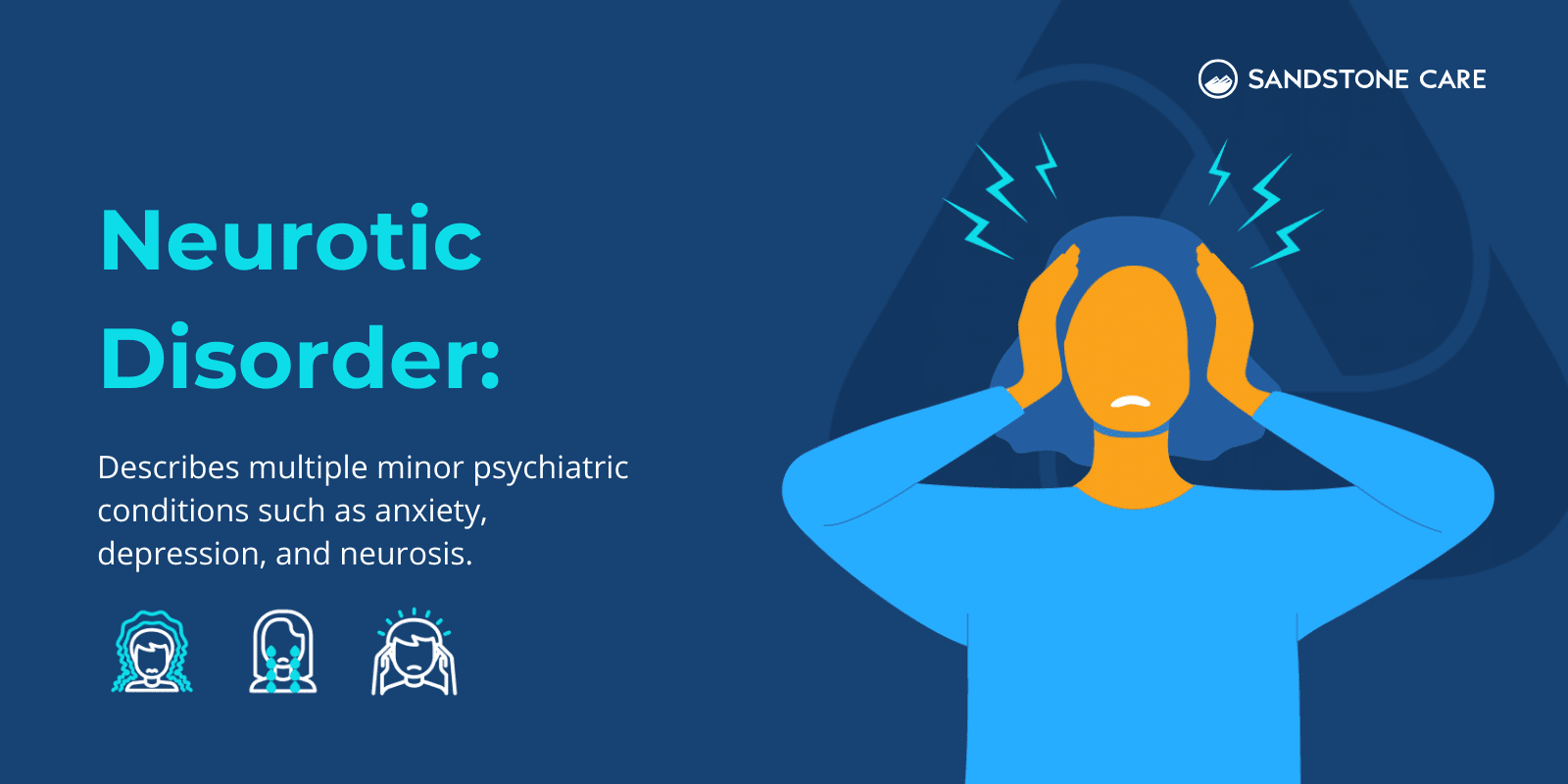
A neurotic person is someone who has traits of neuroticism. These include emotional instability, a tendency toward negative emotions, and high reactivity to stress.
A person who is neurotic commonly experiences anxiety, depression, irritability, and self-consciousness. It is also common for a neurotic person to interpret situations as threatening, making them feel overwhelmed easily.
The reactions and feelings of a person who is neurotic are not by choice. They are thought patterns and feelings that are not under their control.
When a person is neurotic, they are emotionally unstable, making them more likely to respond to situations with anger or irritation.
They are likely to experience and express negative emotions and appear anxious or depressed.
Self-consciousness is also common for people who are neurotic. This looks different for each person but can make someone shy, nervous, or reactive emotionally.
Therefore, an example of a neurotic person is someone who struggles to cope with stress and is highly reactive.
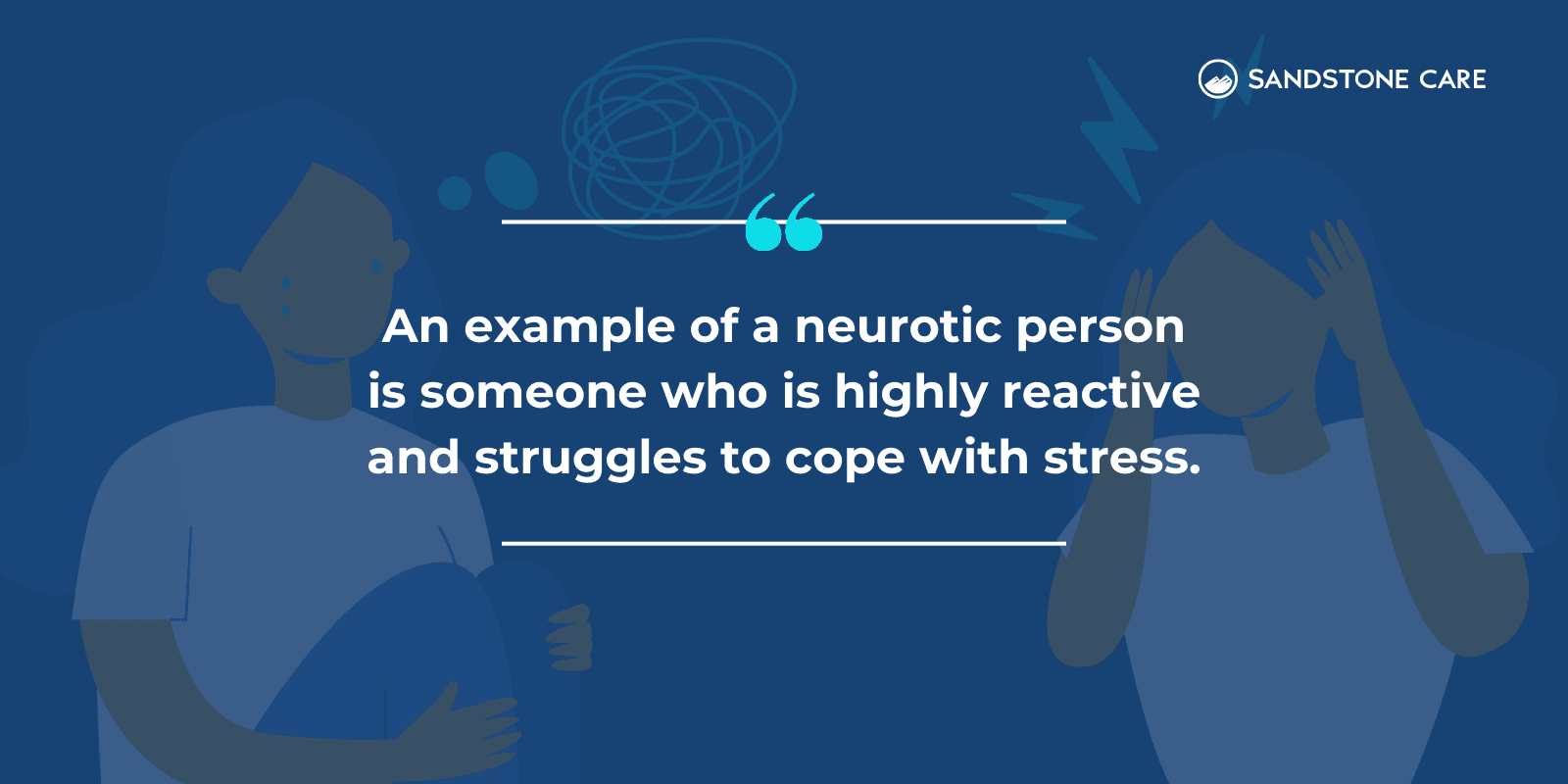
Neurotic behavior stems from deeply rooted conscious or unconscious anxiety. These behaviors, first studied in the 1700s, are difficult to control and often seem irrational or dramatic to others, but they automatically arise when an individual is presented with a real or perceived situation that triggers a personal fear.
A person who is neurotic will experience anxiety or panic in ordinary and safe situations. For example, neurotic behavior includes panicking or intense anxiety when grocery shopping or at a social gathering. While these are ordinary events for many, they often feel stressful and threatening for a person who is neurotic.
A neurotic personality exists on a spectrum, and therefore there are multiple levels of neuroticism. However, neuroticism is one of the big five personality traits.
As a personality trait, it is a tendency towards anxiety, depression, self-doubt, and generally negative emotions. It can also cause obsessive thoughts and uncontrollable negative thoughts.
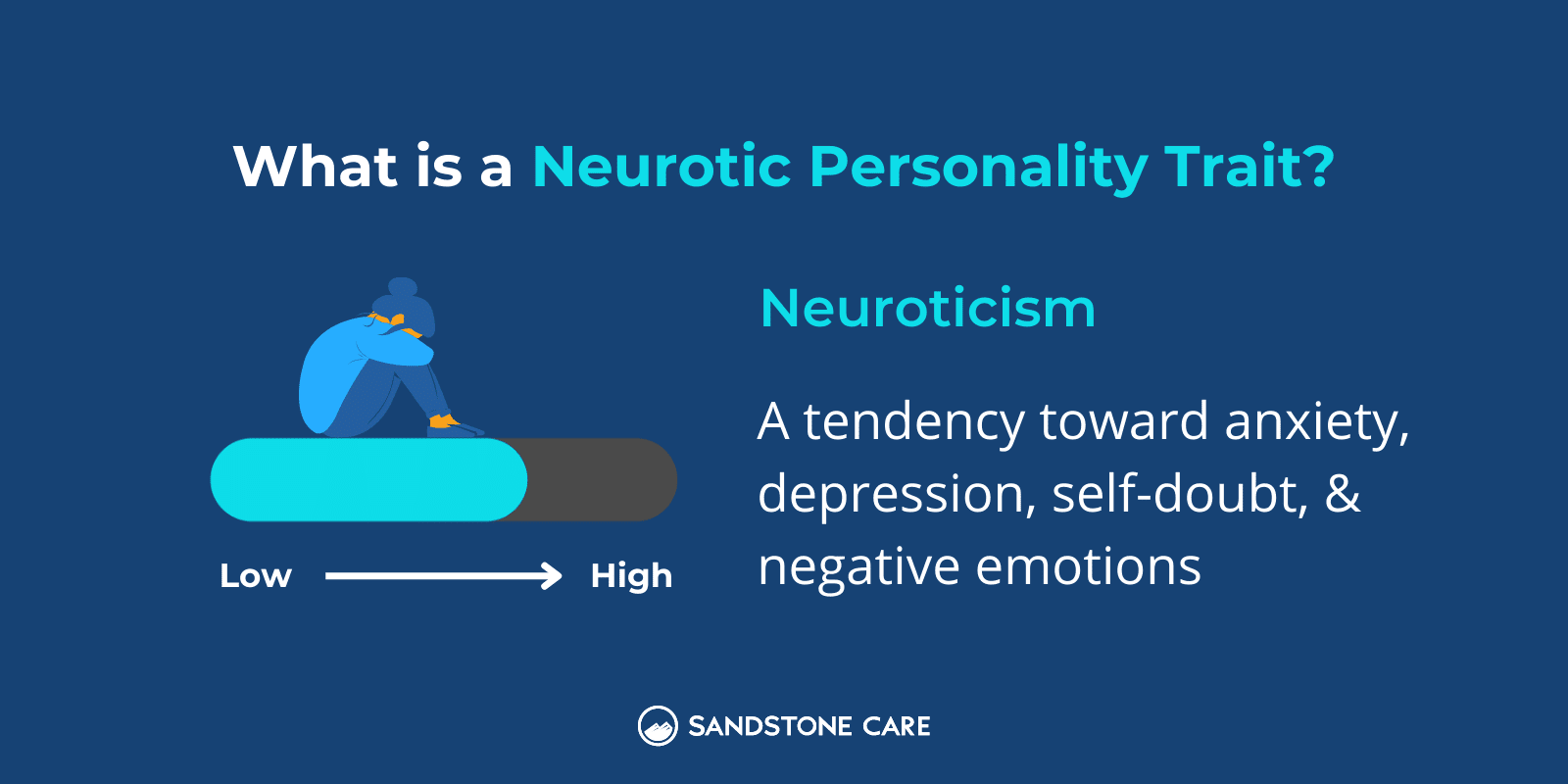
There are many reasons why a person might be neurotic.
Causes may include:
Mental disorders, mental illnesses, or mood disorders can also cause neurotic behaviors.
If a person is displaying neurotic behavior, it can also be a combination of two or more of the factors listed above.
There are multiple drivers of neurotic tendencies. Each person who tends towards neurotic behaviors is influenced by their environment, social circles, and genetics.
However, a person’s mental health influences their personality, including neurosis. Research shows it is a common comorbidity with many mental health disorders and physical illnesses. Therefore, their mental health or physical health can be a primary driver for neurotic tendencies.
A person who tends towards being neurotic might also be influenced by stress or be overworked. These both increase a person’s anxiety and can lead to neurosis. Therefore, lifestyle changes can help decrease neurosis for some people.
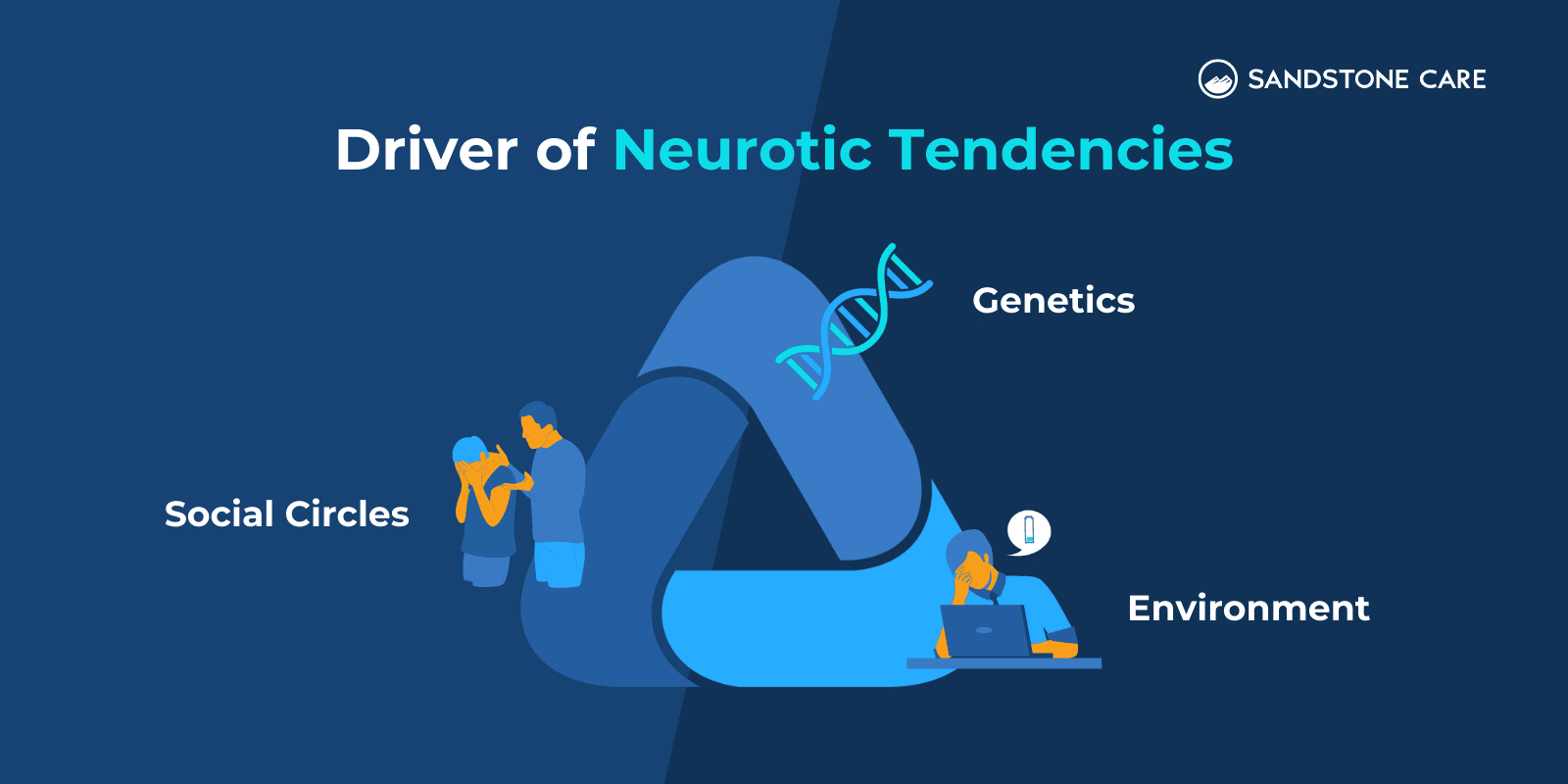
A person who is neurotic will often experience and express negative emotions like anger or irritation. They are likely to react negatively to stress and overreact in situations with little to no stress. Therefore, they can come across as moody or unstable.
Another key sign of a neurotic person is low self-esteem. Depending on the person, this might be expressed as self-doubt or acting self-consciously.
A neurotic person commonly experiences obsessive thought patterns. While these might be expressed or internalized depending on the individual, it often looks like making the same statement or argument multiple times.
Symptoms of a neurotic disorder include uncontrollable anxiety, apprehension, worry, and guilt.
People with a neurotic disorder also struggle with poor reactions to stress, emotional instability, obsessive thoughts, and other neurotic personality traits.
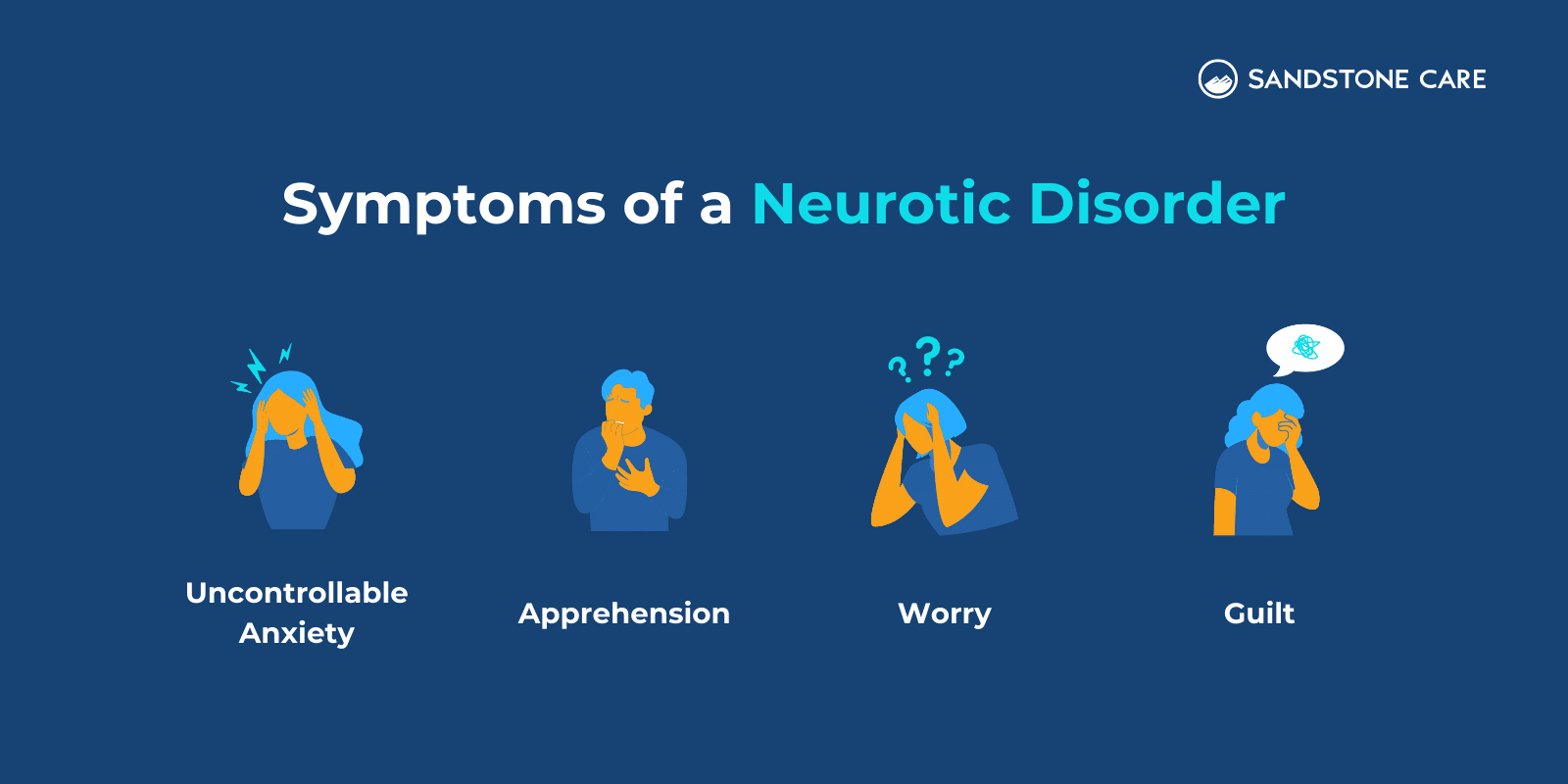
A person who is neurotic will commonly be moody with low emotional stability.
They are also likely to struggle with perfectionism, wanting to make everything a certain way to reduce stress. This is a result of having very little ability to manage stressful situations.
Another common neurotic trait is rumination, where a person repeatedly thinks or talks about something. An example is a person who goes over their packing list multiple times to make sure they have everything.
People who are neurotic tend to struggle with stressful situations and have a low tolerance for stress.
Their reactions are often over the top and do not fit the circumstance at hand. They are likely to be quick to anger, irritable, and unstable emotionally with small stressors.
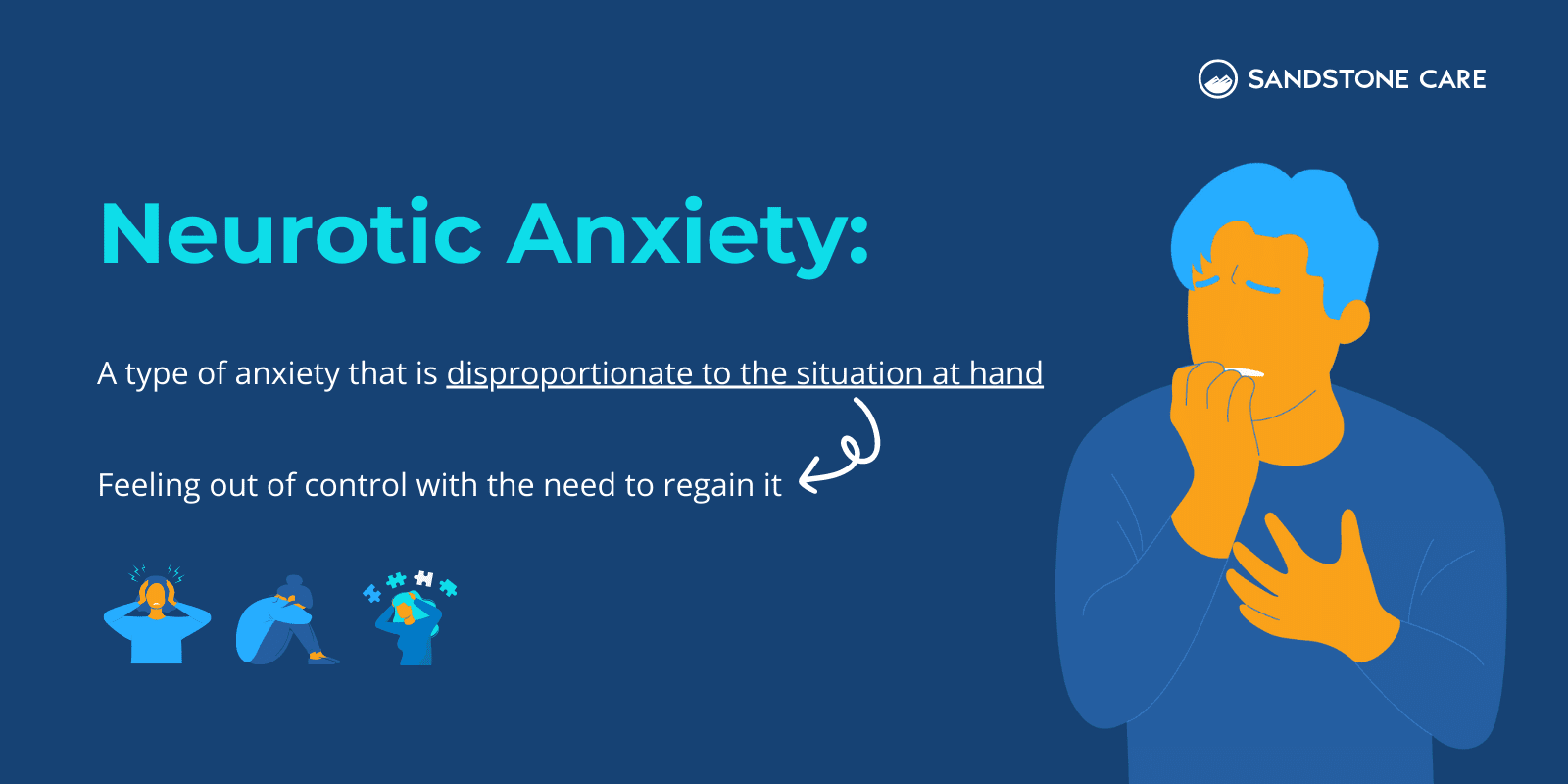
Neurotic anxiety is a term that originated with Sigmund Freud.
It is a type of anxiety that is disproportionate to the situation at hand. It signifies that the person is experiencing feeling out of control and trying to regain a feeling of control.
Anxiety is a healthy and normal reaction for people when worried about an important meeting or conversation that is coming up.
However, neurotic anxiety is the opposite of healthy anxiety. It is an overreaction to the situation that is often persistent after the cause of anxiety has passed. This is because a person with neurotic anxiety has a low tolerance for stress and frustration due to overestimating threats or problems that occur.
An example of a person with neurotic anxiety is a perfectionist.
A person with perfectionist tendencies is never satisfied, constantly feeling the need to achieve, and always thriving for something they should or could do. Healthy anxiety can help a person to make improvements. However, a person with neurotic anxiety is compulsive about making continual changes and achievements.
The basic cause of neurotic anxiety is a combination of genetics, life experiences, and chemical imbalances.
However, the cause of neurotic anxiety will vary for each person.
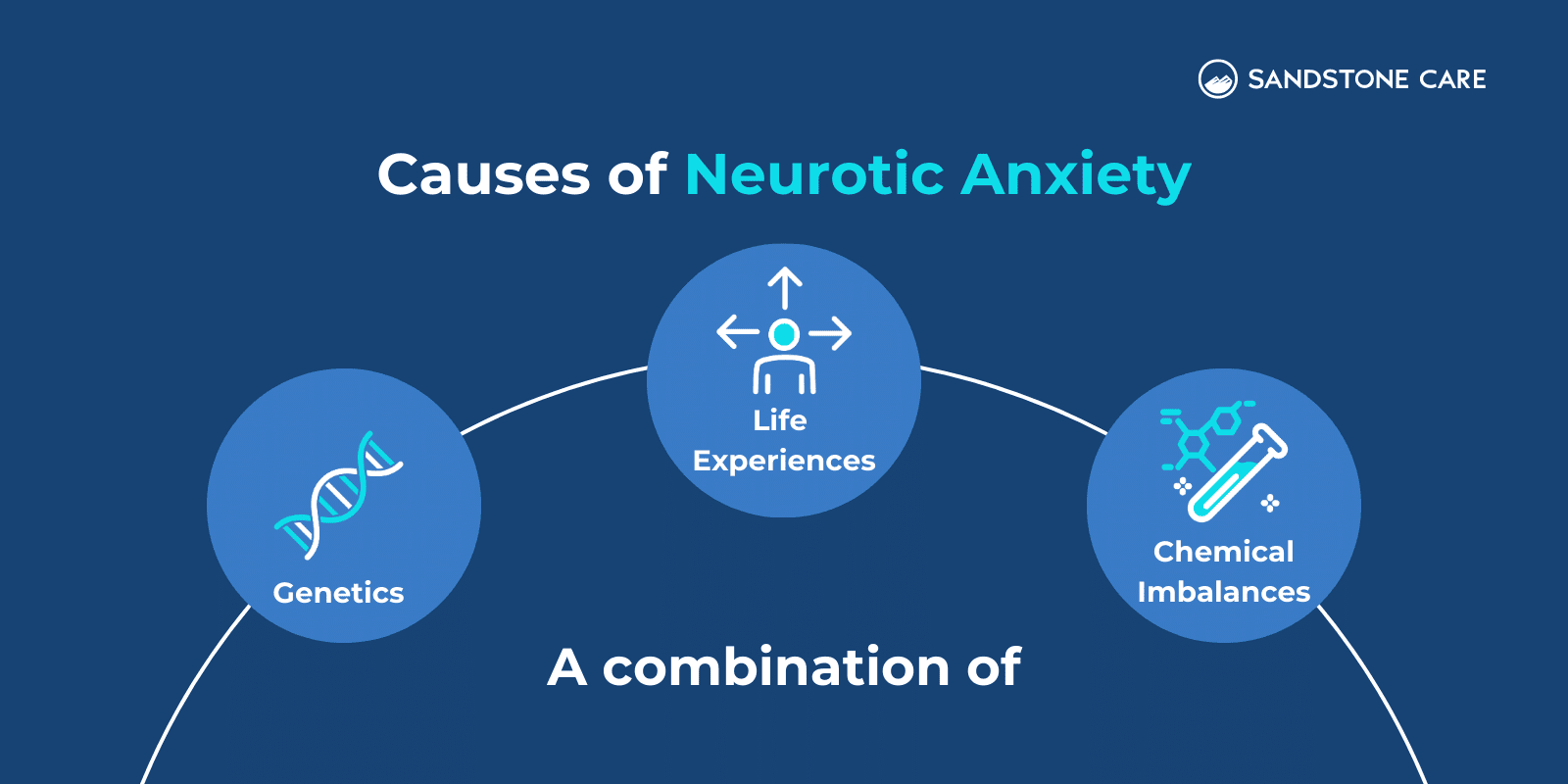
People with neurotic anxiety can overcome it. Like other types of anxiety, it is highly treatable through a trusted mental health treatment facility.
Overcoming neurotic anxiety often includes treatments like cognitive behavioral therapy (CBT) and lifestyle changes that benefit a person’s overall well-being. Through these changes, a person can build a life that helps them to overcome neurotic anxiety.
However, treatment has many individual differences. Working with a healthcare professional helps people to discover the most effective steps to overcome neurotic anxiety.
The length of neurosis will vary for each person, depending on the cause.
When a person has untreated mental health disorders, anxiety neurosis will last longer.
Anxiety neurosis cannot be cured.
However, it can be treated and managed. Through treatment, people work with a psychiatrist to find a medication that helps to find chemical balance. Additionally, people can learn how to make lifestyle changes that provide overall wellness and decrease symptoms of neurosis.
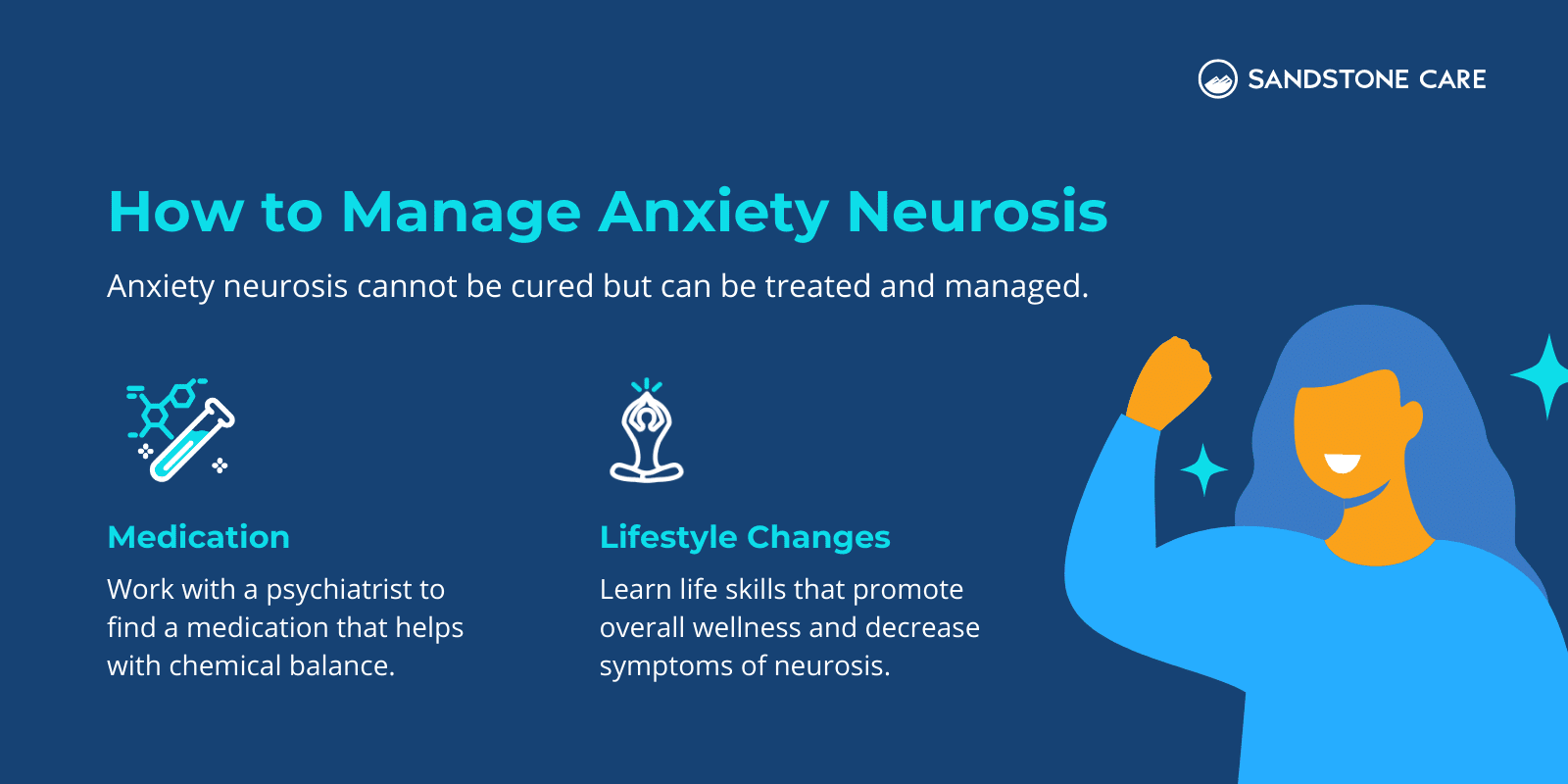
When dealing with a neurotic person, it is helpful to understand that high neuroticism is based on anxiety.
Therefore, if a person’s friend is neurotic, they can be gentle and supportive of them. This might look like helping them to feel comfortable in a situation by reassuring them they are safe. Reassurances can be verbal or physical to help a person feel comfortable and safe.
However, people who are neurotic are responsible for themselves. Therefore, a person can give a neurotic person space if they are reacting with anger or hostility, which will protect them from these reactions.
Neurotic people are often seen as toxic, but they are not inherently toxic.
Neuroticism is a personality trait that can have many benefits. A neurotic person who is healthy is likely to be cautious, plan for the future, and be a conservative decision-maker. This can be very effective and helpful in many personal and professional relationships.
However, a neurotic person who is not healthy might be toxic. This will depend on the level of neuroticism and how that person manages their mental health.

Calling a person neurotic generally refers to their reactions. A neurotic person has dramatic and irrational physical, mental, and emotional reactions.
Neurosis has many public health implications, as it increases a person’s risk for many co-occurring and chronic mental and physical disorders.
Additionally, neurotic people impact those they spend time with. However, the effect they have will depend on how their mental health and neurosis are managed.
An unhealthy person who is neurotic is often toxic. However, a person who is neurotic and healthy can be a wonderful addition to a home and workplace.

The neurotic disorder is not in the DSM; it was eliminated in 1980. However, neuroticism is listed in the DSM as one of five personality traits.
How do you diagnose neurotic personality disorder?
Neuroticism is a trait that is part of two personality disorders, including borderline personality disorder (BPD) and antisocial personality disorder (ASPD).
As a personality trait, it is characterized by obsessive thinking, anxiety, distress, and dysfunction in daily tasks.
Working with a mental health care professional is the best way for a person to learn if they are neurotic.
However, common traits include a tendency towards negative emotions, anxiety, mood swings, and low self-esteem. These traits can be self-identified or identified by a loved one.
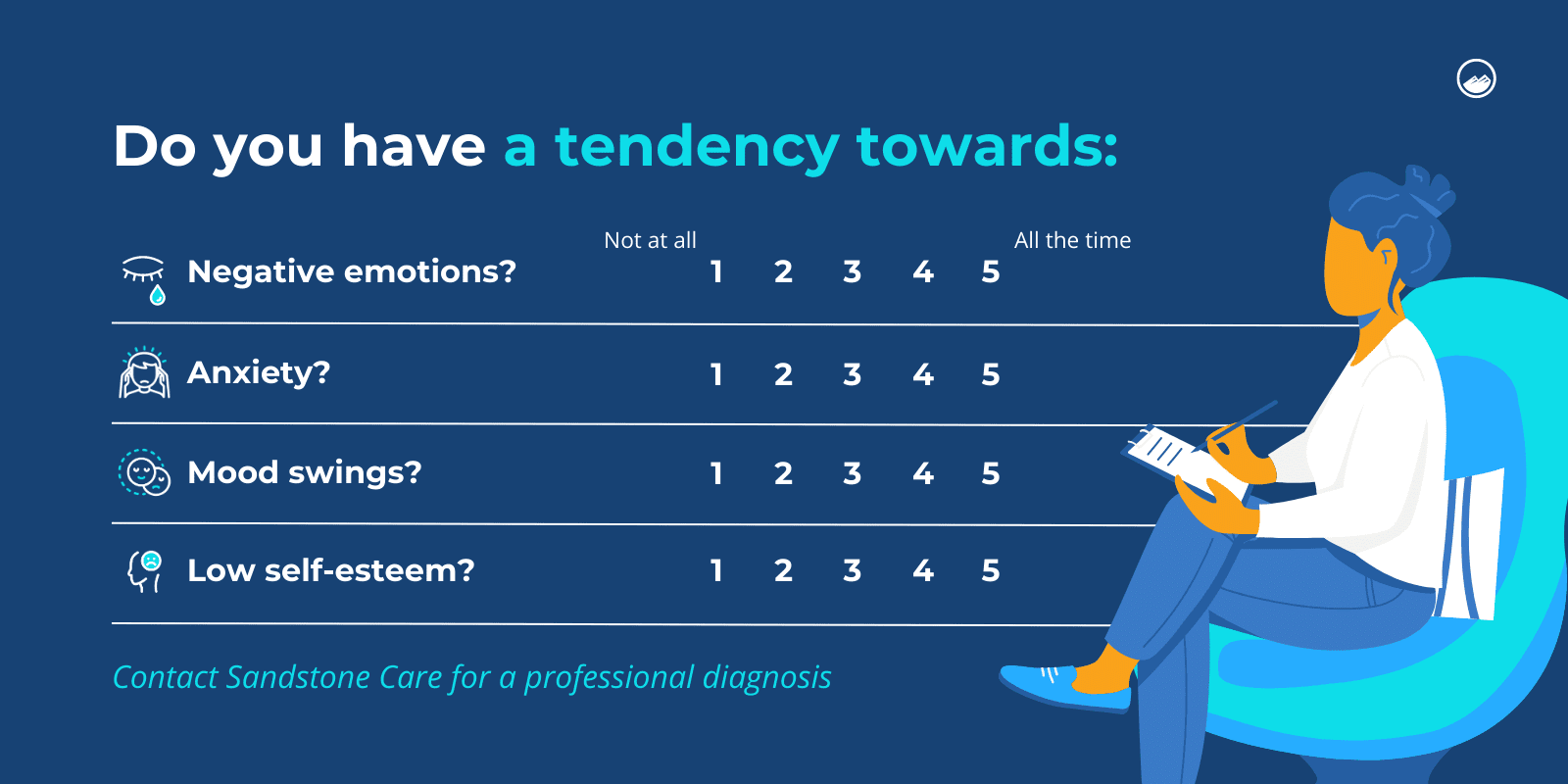
The big five personality traits include extroversion, agreeableness, openness, consciousness, and neuroticism.
Neuroticism is defined as a tendency to experience anxiety, depression, self-doubt, and other negative feelings. As a personality trait, people have neuroticism at different levels, and it can appear differently depending on the combination of other personality traits they have.
Neuroticism, like other personality traits, is related to IQ.
Research has people with high neuroticism tend to have lower IQs. However, a person’s IQ is also correlated with other personality traits. Therefore, every person is unique in their IQ and combination of personality traits.
The best treatment for neurotic personality disorder generally includes psychotherapy, medication, and relaxation. However, other types of therapy and environmental changes can also help.
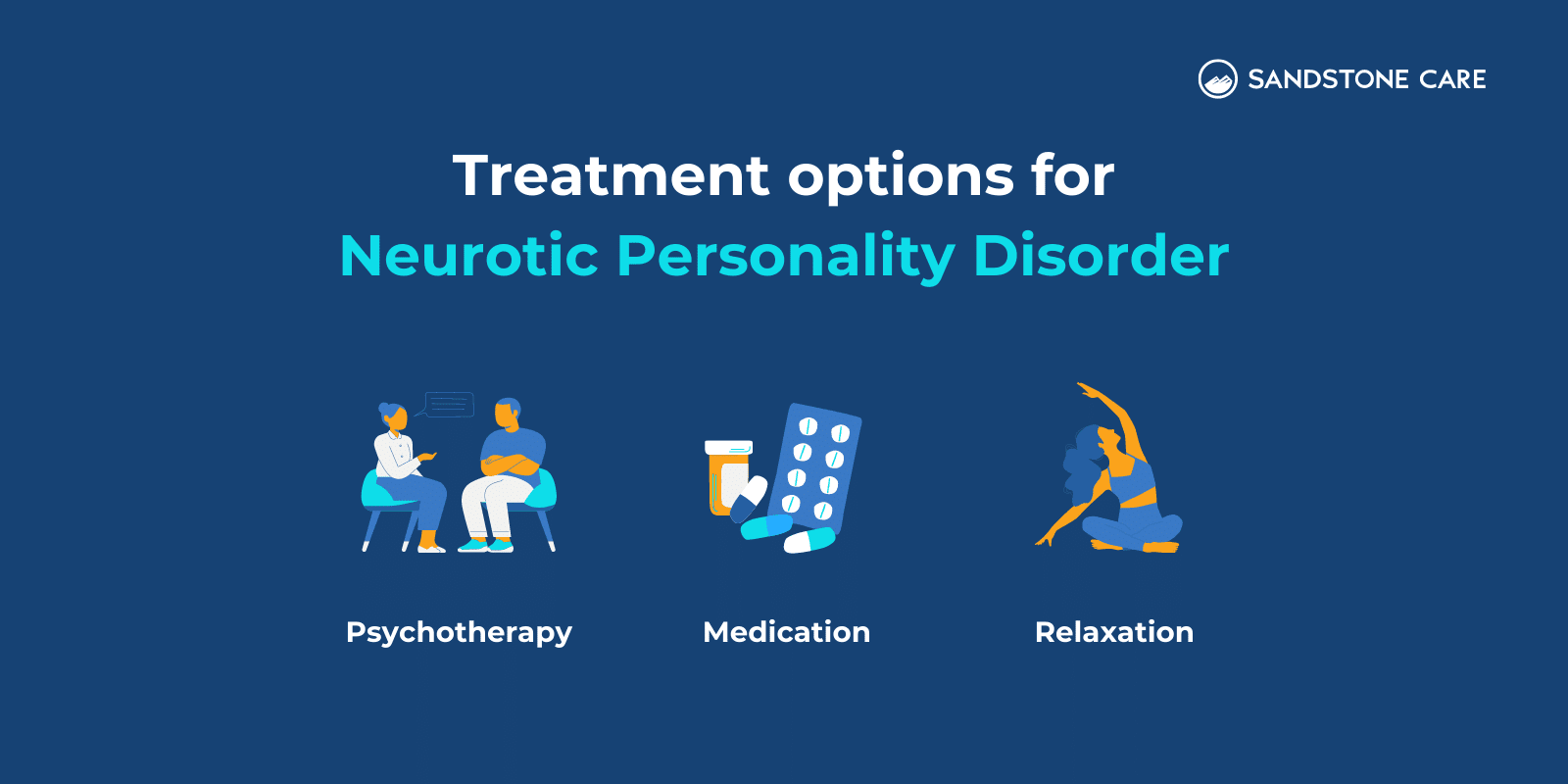
Many people are neurotic due to a combination of factors, including genetic and environmental.
Therefore, someone can decrease neurotic behavior. However, they may be predisposed to neuroticism but can be healthy and functional.
Overcoming neuroticism is possible by learning healthy coping skills.
However, a certain level of neuroticism will likely remain part of a person’s personality. A person can adjust their behavior and reactions to stress, building more tolerance to frustration. Healthy coping skills can help a person to benefit from the positives of neuroticism.
FAQ
Our goal is to provide the most helpful information. Please reach out to us if you have any additional questions. We are here to help in any way we can.
A person who is neurotic experiences extreme mental, emotional, and physical reactions.
This is very different from someone who is obsessive-compulsive. Obsessive-compulsive individuals experience repeated thought patterns that are intrusive and compel them to do certain tasks.
A neurotic is not a narcissist. However, a narcissist can be neurotic.
Neurotic people are self-motivated individuals who are very skilled at decision-making for long-term success.
They tend to continuously strive to do their best, wanting to exceed expectations.
People who are neurotic tend to take fewer risks and be skilled at providing for others.
People who are neurotic tend to thrive in environments where they feel safe but allow them to do their work.
This can look different for each person. However, jobs like accounting, writing, or design are potential ideas.
Research shows that neuroticism decreases with age until about 80 years old, when it slightly increases.
The term neurosis is no longer used today because it was used to describe a mechanism rather than an observable behavior.
Having a neurotic personality means being disposed toward emotional instability, self-consciousness, and negative emotions.


Unhealthy neurosis can cause many issues in a person’s life. Sandstone Care is here to support teens and young adults with mental health and substance use disorders.